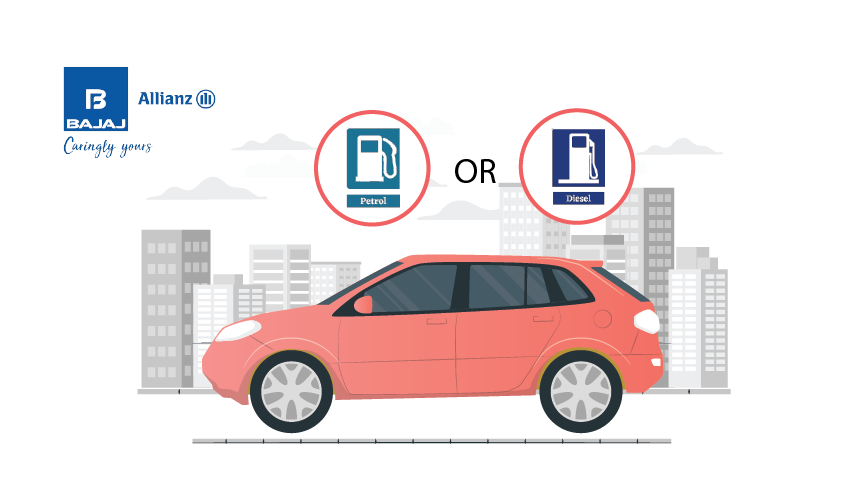One of the fundamental choices that car buyers face is whether to opt for a petrol or diesel engine. This decision not only affects the performance and fuel efficiency of the vehicle but also has a significant impact on car insurance premiums. In this blog, we delve into the differences between petrol and diesel cars and how they affect car insurance premiums.
Understanding Car Insurance Premiums
Before understanding the specifics of petrol vs. diesel, let's first understand what car insurance premiums are. A
car insurance premiums is the amount you pay to your insurance provider to keep your vehicle covered against various risks. This includes damage due to accidents, theft, natural disasters, and more. The premium amount is calculated based on several factors, including the type of insurance policy, the value of the vehicle, the location, and the driver's profile. You can also use a
car insurance premium calculator to better understand.
Petrol vs. Diesel: The Cost Factor
One of the key factors that influence car insurance premiums is the cost of the vehicle. Generally, diesel-powered cars are priced higher than their petrol counterparts. This higher price tag directly impacts the insurance premium, as the premium amount is directly proportional to the vehicle's value. So, if you opt for a diesel car, be prepared to pay a slightly higher insurance premium compared to a petrol car.
Repair Costs and Insurance Premiums
Another factor to consider is the cost of repairs. Diesel-powered cars often require more expensive repairs compared to petrol cars. As a result, insurance providers may charge a higher premium for diesel vehicles to cover these potential repair costs. This is particularly true for high-end cars and vehicles with expensive spare parts. So, while diesel cars may offer better fuel efficiency, it's essential to factor in the potential higher repair costs when considering insurance premiums.
Insurance Declared Value (IDV) and Fuel Type
The
IDV of a vehicle is its approximate market value, and it plays a crucial role in determining insurance premiums. Since diesel cars are generally priced higher, their IDV will also be higher, leading to a higher insurance premium.
Engine Capacity and Premium Calculation
The engine capacity of a vehicle also influences insurance premiums. Diesel engines typically have higher capacities compared to petrol engines, which can lead to higher premiums. Insurance providers consider various factors such as engine capacity, age of the vehicle, and driving history to calculate the premium amount. So, if you opt for a diesel car with a larger engine capacity, be prepared for a slightly higher insurance premium.
Fuel Efficiency and Insurance Costs
Fuel efficiency is another crucial factor to consider when choosing between petrol and diesel cars. While petrol cars may offer better mileage for short trips, diesel cars are more fuel-efficient for long journeys. This difference in fuel efficiency can impact insurance premiums, as insurance providers take into account the average distance travelled when calculating premiums. If you plan to use your car for long-distance travel, opting for a diesel car may result in lower insurance costs over time.
Resale Value and Insurance Premiums
The resale value of a vehicle is an essential consideration for many car buyers. Diesel cars typically have higher resale values compared to petrol cars due to their lower depreciation rates. This can also impact insurance premiums, as insurance providers may take into account the
vehicle's resale value when calculating premiums. So, if you plan to sell your car in the future, opting for a diesel car may result in higher returns.
Environmental Impact and Insurance Premiums
In the environmentally conscious world, the environmental impact of a vehicle is a significant consideration for many car buyers. Diesel cars generally produce less carbon dioxide but emit more pollutant particulate matter compared to petrol cars. Insurance providers may take into account the environmental impact of a vehicle when calculating premiums, so choosing a petrol car may result in lower insurance costs for environmentally conscious drivers.
Conclusion
The choice between petrol and diesel cars can have a significant impact on car insurance premiums. Factors such as the cost of the vehicle, repair costs, fuel efficiency, resale value, and environmental impact all play a role in determining
third-party car insurance premiums. By considering these factors carefully, you can choose the right fuel type and insurance policy to suit your needs and budget.
*Standard T&C Apply
*Insurance is the subject matter of solicitation. For more details on benefits, exclusions, limitations, terms and conditions, please read sales brochure/policy wording carefully before concluding a sale.
 Service Chat: +91 75072 45858
Service Chat: +91 75072 45858


